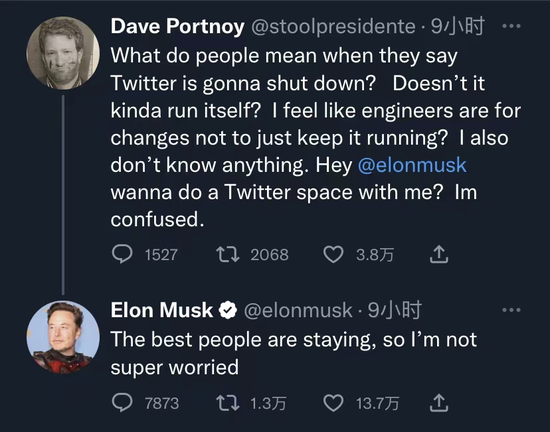your current location is:Home > Finance > depthHomedepth
Retirement, assessment, layoffs: Can Twitter overcome the difficulties behind Musk's ultimatum?
Musk's reforms have entered the "deep water zone": employees are required to work overtime in order to reverse the bleak prospects of Twitter.
"The best employees are staying, so I'm not very worried," Musk responded on Twitter to the statement that Twitter may be shut down.
Since this week, Musk's reform of Twitter has entered the "deep water area." From initially requiring employees to sit on duty and work overtime, to a large number of employees leaving, to Musk's softening attitude, and to publicly stating on Twitter that he was "not very worried", it was difficult for the outside world to speculate on Musk's future direction of Twitter.
What is more noteworthy is that Musk mentioned in multiple emails that he asked employees to work overtime because Twitter mainly relies on advertising revenue for profit, but in the context of economic downturn, advertising revenue is unsustainable, and the company's prospects Worrying.
A number of analysts told reporters that the U.S. inflation is high and the Federal Reserve is aggressively raising interest rates. The U.S. economy is now in the process of going from overheating to recession, and the poor macroeconomic situation has led to an increase in layoffs. From the perspective of business model, American social network applications have encountered competitors, including emerging social applications such as TikTok, which have shrunk the user share of social network giants, especially in the competition for user time and attention. Twitter’s prospects are unpredictable.

Musk tweeted that the best Twitter employees stayed.
"Workaholic" Musk asks employees to stay on duty, triggering Twitter personnel earthquake
Sleeping in the Tesla factory during Tesla's rise, and staying in the Twitter office all night after taking over Twitter. "Workaholic" Musk seems to want to infect Twitter employees with his enthusiasm for work, but employees don't buy it.
On November 9th, Eastern Time, Musk sent an email to employees for the first time after taking over Twitter, but he did not bring good news.
"I can't speak well," Musk sounded the alarm to employees: Twitter mainly relies on advertising revenue to survive, but in the context of slowing global economic growth, Twitter's prospects are bleak and new profits must be found Way.
Musk regards paid subscriptions as one of the pillars of Twitter's profitability, and said that if this product cannot bring in considerable income, Twitter may not be able to survive in the next economic environment.
Musk hopes employees can prepare for the tough times ahead, which will require employees to work hard to succeed.
Specifically, he asked employees to stop telecommuting, and each employee needs to work at least 40 hours a week. On average, each working day requires about 8 hours of work.
The reporter learned that due to the impact of the epidemic, many Internet companies in the United States, including Google and Facebook, have allowed employees to work remotely. In May 2020, Twitter announced that it will allow some employees to work remotely for a long time, will not hold major meetings within 4 months, and will hardly arrange business trips.
Musk's email is just the beginning of Twitter's next "turbulent" moment.
On November 11th, Eastern Time, Musk sent an email to Twitter employees saying, "Yesterday I stayed at the Twitter headquarters late at night again." Express thankfulness. He said he would like to communicate with employees face to face in the office.
Musk also mentioned in the email that he believes in the efficiency of centralized office.
In the next few days, the news that Musk fired more than 80% of Twitter's contract workers became a hot topic. Of Twitter's 5,500 employees, 4,400 are expected to be laid off.
But Musk didn't stop there. According to multiple media reports, on November 16, Eastern Time, Musk once again issued an email to the remaining employees, asking them to stand at a fork in the road: employees must choose to stay on Twitter or leave.
In this email, Musk stated that he is building the 2.0 version of Twitter, which requires a very "hard core" to succeed in an increasingly competitive world. And only employees who can accept long hours and high-intensity work, and employees who "can only be qualified if they perform well" can stay on Twitter.
Musk asked employees to make a choice before 5 pm Eastern Time on November 17. If they leave Twitter, employees will receive a resignation compensation equivalent to three months' salary.
Soften to employees to allow remote work Musk personally explained the departure rumors
However, while Musk fired employees one after another, some new situations seemed to emerge.
A netizen pretending to be a Twitter employee joked: "I was fired by Twitter this afternoon. I was responsible for the certification visit of the office at Twitter. Musk just called me and asked if I could go back and help them re-enter Twitter." Special HQ because they turned off all authentication and accidentally locked themselves out".
Musk forwarded and commented, "Thank you for your help, you are really my savior."

Musk joked on Twitter, thanking "departed employees" for coming back to help Twitter.
Behind this joke, some "key employees" of Twitter seem to have left in the wave of layoffs, which affected the normal operation of Twitter.
Under the "bombing" of multiple emails, many employees chose to leave Twitter.
According to media reports, perhaps the number of resigned employees exceeded Musk’s expectations. Musk softened his attitude and sent an email to the employee again saying that if the manager is willing to act as a guarantor to ensure that the employee has made outstanding contributions, then the employee can work from home. However, Musk still requires employees to come to the company for a meeting once a month.
The personnel earthquake has aroused concerns about Twitter, and Musk's own lawsuit is even more concerning.
Recently, Tesla shareholders sued Musk case in Delaware court in the United States. The reporter learned that Tesla shareholders want to revoke the US$56 billion equity incentive plan (also known as the "remuneration plan") previously granted to Musk. many other companies within.
During his court appearance, Musk said he expected to spend less time on Twitter and eventually find a new CEO for Twitter.
Musk responded to this on November 17, saying that he would continue to operate Twitter until Twitter was in a strong position, which would take some time.

Musk explained on Twitter that he will not step down as CEO immediately.
How could Twitter's "dark outlook" be reversed?
Musk once said bluntly that his acquisition was not for money.
"I don't care about economic issues at all." When referring to the $44 billion acquisition of Twitter, Musk said that he believes that having a "public platform with maximum trust and broad inclusiveness" is extremely important for human civilization. And he believes that Twitter is currently difficult to serve the needs of society.
But it is worth noting that Musk has revealed in multiple emails that he asked employees to work overtime because he was worried about the prospects of Twitter.
Fang Xingdong, Qiushi Distinguished Professor of Zhejiang University and executive director of Zhejiang University’s Public Diplomacy and Strategic Communication Research Center, told reporters that Musk’s $44 billion acquisition of Twitter is obviously not worthwhile. From the perspective of Musk’s desire to build WeChat, Musk needs to get rid of the pure advertising model and enhance the user charging model, but this involves differences in the characteristics and attributes of the platform. It may not only destroy the needs of the original user group, but also fail to meet the needs of the new user group. This is also the reason why Musk is currently laying off a large number of employees and sparing no effort to reduce costs. There is currently no hope for open source, and throttling can be easily manipulated. Reducing Twitter's losses is something he can grasp at present.
Regarding the future transformation of Twitter, Fang Xingdong believes that traditional social media based on interpersonal relationships has begun to enter a period of saturation. Whether it is Twitter, Facebook, or WeChat, they are all facing tremendous competitive pressure from TikTok, which is driven by data and algorithms. The power of communication based on interpersonal relationships is far inferior to that based on algorithms. At present, the Internet industry has begun to enter a new cycle of the decline of traditional social media and the rise of smart media.
Zhang Xiaorong, president of the Deepin Technology Research Institute, said that Musk believes that Twitter has suffered long-term losses, and the major layoffs are to reduce costs. The benefit of doing so is that Musk hopes to reduce the resistance to transforming Twitter into a new global social platform. Layoffs can remove opponents and allow the transformation plan to advance.
The negative impact is that the company’s internal control mechanism failed due to too few manpower and unstable handover. For example, Twitter had a loophole in the transformation of the blue V fee certification, and a large number of machine accounts appeared. There was no warning or plan before, which made the transformation plan unable to go smoothly. Implementation can only be suspended.
Some analysts told reporters that U.S. technology stocks have now entered a period of turbulence, and winter is approaching. There is a lack of killer application innovation in the current Internet field. Applications including Twitter have not undergone essential changes in the past ten years, but now the bonus period of these killer applications has come to an end, and they are facing the possibility of being replaced by new applications. . "The U.S. technology giants have reached the transition window period."
related articles
Article Comments (0)
- This article has not received comments yet, hurry up and grab the first frame~













